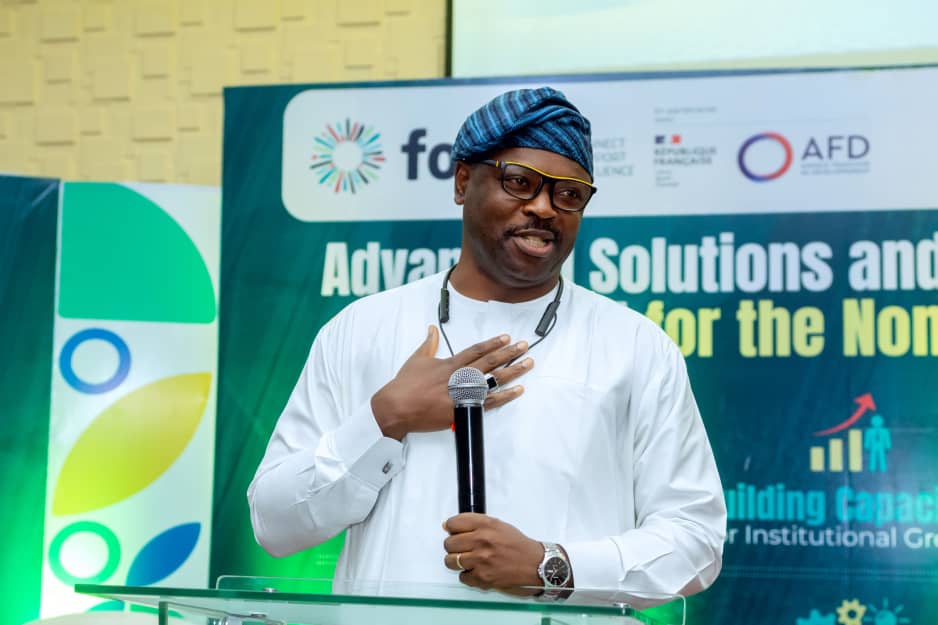NNNGO Annual General Meeting 2025: Strengthening Governance, Accountability, and Sector Resilience
NNNGO Annual Conference and AGM
November 12, 2025 – Lagos, Nigeria.
- Theme: Advancing Solutions and Institutional Support for the Nonprofit Sector
The Nigeria Network of NGOs held its Annual General Meeting (AGM) on November 12, 2025, as part of the Network’s flagship Annual Conference in Lagos. The session, during which Mr. Oyebisi Babatunde Oluseyi, Executive Director, NNNGO, formally reported the activities of the Network, provided members with key updates on governance, institutional reforms, regulatory developments, and the strategic direction for the coming year.
A Stronger Board for a Stronger Sector
In his opening remarks, Oyebisi reflected on the onboarding of new Board Members earlier in March 2025. He noted that the strengthened Board made up of seasoned professionals and sector leaders – positions the Network to deliver more effectively on its mandate, particularly as NNNGO implements its new Strategic Plan.
According to recent research conducted by the NEAR Network, NNNGO has emerged as the most mature and advanced civil society network in Africa, a milestone that lauds the Network’s credibility and long-standing commitment to institutional excellence. Oyebisi emphasised that this success belongs to the members. Further noting and stressing the strength of NNNGO – “With our analysis of 178 member budgets out of 4,060 organisations, we documented a combined value of ₦1 billion. If we assessed the full membership, we would be looking at a potential ₦1 trillion contribution to the Nigerian economy. This is the strength of our Network.”
Defending the Sector: Regulatory Advocacy and Compliance Preparedness
One of the most significant areas of focus at the AGM was the increasing regulatory pressure on nonprofits in Nigeria.
Mr. Oyebisi highlighted NNNGO’s tireless advocacy to “defending the sector 110%” in engagements with: The Corporate Affairs Commission, The Federal Inland Revenue Service, and emerging tax and compliance frameworks. With Nigeria’s new tax law tightening scrutiny on nonprofit financial transactions, Oyebisi stressed that 2026 will usher in an era of stricter regulations. He warned that nonprofits must be fully prepared: File annual returns consistently; Pay PAYE for staff; Pay Withholding Tax (WHT) for consultants; Keep accurate receipts and financial documentation; Maintain transparent accounting systems; Understand VAT obligations on non-exempt items. (Penalties now range from ₦50,000 to ₦100,000, particularly affecting organisations unknowingly operating outside compliance)
He also noted that If running a nonprofit becomes too burdensome, it is wise to pause and reconsider. “If it will be a burden for you to run a Nonprofit, please close shops, it’s not to scare you, but because we all know the economy is not as prosperous, if you can only help 50 or 10 beneficiaries, do so and close your eyes.”
He added that NNNGO is already exploring discussions around possible tax amnesty for the sector, especially for small and emerging organisations.
Strengthening Systems to Enhance Member Access to Funding
Looking ahead, Mr. Oyebisi announced plans to establish strong, functional internal systems that will help member organisations improve their capacity, governance, financial systems, and grant-readiness.
This initiative aims to position NNNGO members to secure funds from leading national and international funding organisations by meeting global compliance and reporting standards.
Civil Society Recognition: Sustaining Influence at the Global Level
The AGM also touched on the evolving relationship between civil society and global governance institutions.
While civil society voices face declining acceptance in some international spaces, NNNGO continues to champion strong representation. Mr. Oyebisi cited the organisation’s advocacy at the United Nations, including engagements involving the UN Secretary-General – where the Network emphasized the need for inclusive civil society participation in global decision-making processes.
This, he said, remains a core pillar of NNNGO’s work: ensuring Nigerian civil society stays visible, respected, and influential on the global stage.
A Network Strengthened by Its Members
In closing, Mr. Oyebisi Babatunde Oluseyi expressed deep gratitude to NNNGO’s partners, donors, and member organisations whose contributions sustain the Network’s work. “Because of you, we are the Nigeria Network of NGOs. Without your commitment, we cannot do what we do. This Network is strong because you are strong.”
The AGM reaffirmed NNNGO’s commitment to strengthening governance, enhancing institutional support, navigating regulatory shifts, and driving sustainable growth across Nigeria’s nonprofit ecosystem.

